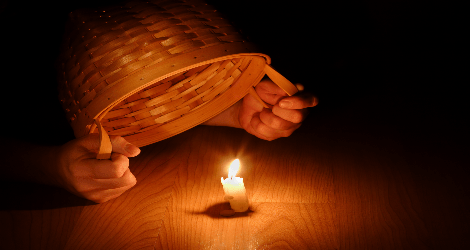The Second Stage of Church
By Eleanor Reed Held In this article, Eleanor Reed Held takes a look at the different ways Christians practice church, arguing that practice must extend beyond Sunday morning and pietism, reaching into public life, or what she calls the “second stage.”When we talk about the church, what we are really talking about are the people that make up the church: the members. So, it seems to me, that before we can even examine the role the church plays in the public sphere, we have to get a handle on its members and how they practice church.
The church-goer (“church-practicer”) generally falls into one of five categories:
- The Holiday-practicer: attends church only on Christmas, Easter, and whenever someone dies (not really a holiday, but the same idea);
- The Sunday-practicer: attends church, maybe even Sunday School, then goes home and forgets about most things until the next week;
- The Solo-practicer: not only attends church and Sunday School, but throughout the week continues solo with activities like prayer and meditation—also checks behavior and makes sure it is sufficiently Christian-like;
- The Sermon-practicer: does all the above while also talking about his or her faith with others and sermonizing; and finally,
- The Giving-practicer: not only talks about being a Christian, but demonstrates it by practicing the good. I don’t just mean giving money; I mean getting out into the community and getting her hands dirty. There is a wide variety of opportunities for the giving-practicer, ranging from visiting a shut-in to lobbying for political change to going on a mission trip to another country (or the neighborhood just down the street).
The more Giving-practicers in the church, the larger the role the church plays in the public square. It is they who operate from the belief that Christianity is to be enacted. In other words, Christianity is a public and holistic identity that should ethically impact every decision and action throughout the week, rather than be compartmentalized (privatized) to Sunday morning or Bible studies. Jesus did not give his life for an hour of our time. He gave his life so that we could be radically transformed.
___________________________________________
Jesus did not give his life for an hour of our time.
___________________________________________
I grew up in a church that promoted the Giving-practicer lifestyle. We have “House Churches” in addition to the usual Sunday morning congregational worship. These are groups that meet during the week at people’s houses, and they focus on a particular mission. For instance, one runs a clothes closet, one ministers with local AIDS victims, one does outreach to churches in Africa, and so on. It is not obligatory to be a member of a House Church if you attend my church, but from what I can tell, most people jump right into one House Church or another, not because they feel pressured but because they find joy in responding to their faith this way. God has given us great things, so it seems natural to give something back.
When I grew up and flew the coop, I got the chance to visit other churches. While I saw outreach in these churches, it seemed to be mostly done by the older retired folk (those who had “time”). A few younger people would get involved, but there was not the same sense of joy as in my church at home, and on the whole, people demonstrated more of the Sunday-practicer or Holiday-practicer type. I was disturbed by these practices because they ran so counter to what my own church had taught me: that private spiritual development and personal satisfaction are not the chief priorities for a Christian life. While attending church is good for self-nurturing and praying and praising God and all that, the church should cultivate members who give their time and energy to help others. That is, after all, what Jesus told us to do.
In high school, I was part of a House Church called “Second Stage,” which brought together faith, drama, and clowning. I was told that the name came from the idea that the first stage was to have faith and the second stage was to act on that faith.
I guess the church has always had issues with how much it should engage the public sphere, especially when wanting to respect other cultures and religions. I have often heard how preachers avoid politics for fear of offending people. But I believe the church has a responsibility to work with social injustices, not just donate, preach, or pray about them (as the first four practicers do) but to physically do something about these social wrongs. Of all the church-goers, it is only the Giving-practicer who truly reaches that second stage of acting out faith.
Maybe it is time we all got up on that stage.
Eleanor Reed Held is a recent graduate of Durham University (UK) with an MA in Religion and Society and is currently working at Stony Point, NY as resident fellow. She considers Harrisonburg VA as her home base and is interested in interfaith social justice and peacework. Stony Point Center is An Open Space… Welcoming all people, discerning God’s call to faithful action, building community that crosses boundaries, nurturing leaders who transform the world, learning to live in harmony with creation, sharing sacred spiritual practices, and creating pathways to peace, nonviolence, and justice.









